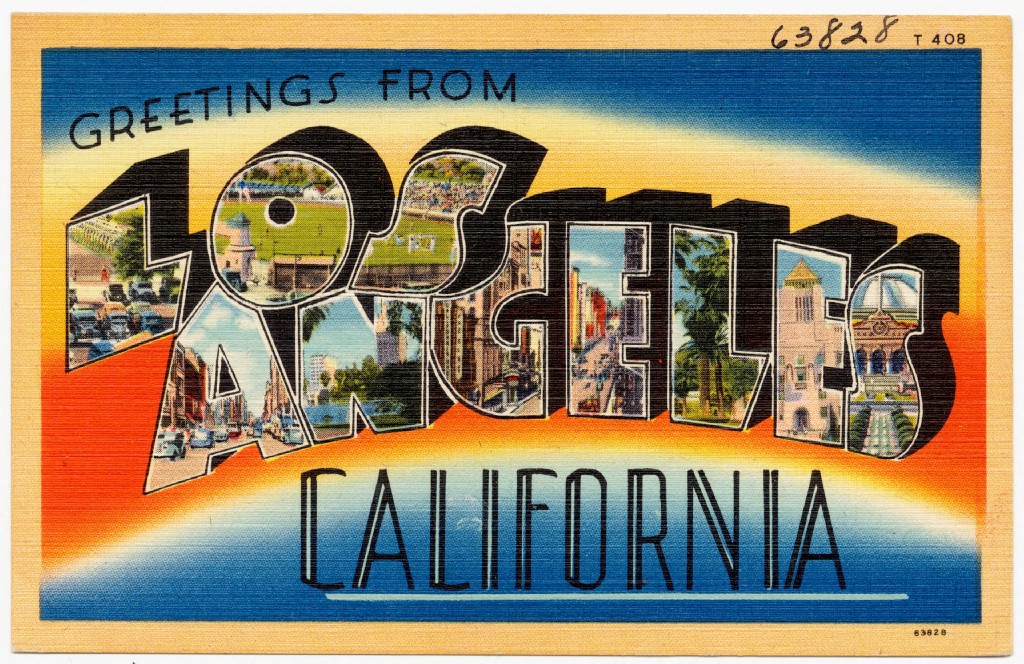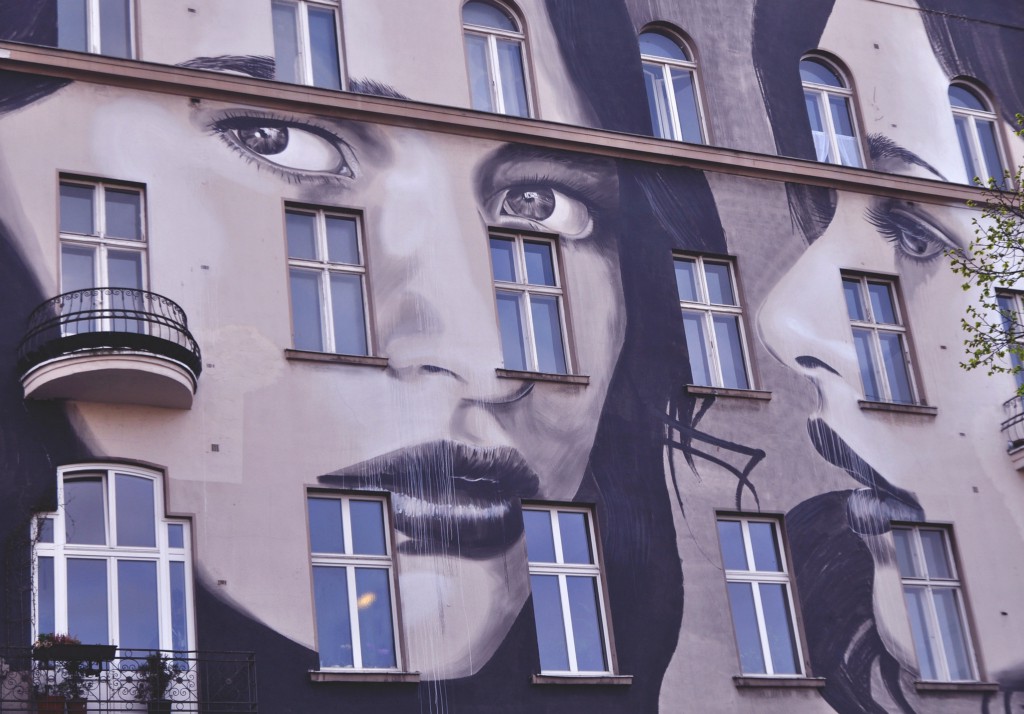interviews
The Writing Life on the Road: Rocio Carlos’ Los Angeles

A visit to the city where pagan & Catholic rituals go hand-in-hand, ghosts are everywhere, and poetry speaks to the community

Electric Literature’s contributing editor Michael J Seidlinger is on the road as part of his project, #followmebook, visiting writers and exploring the limits of social media. As part of a limited summer series called “The Writing Life on the Road,” he’s sharing his conversations with writers he encounters as he makes his way from New York to California. This week, the poet Rocio Carlos, shares details and insights from her writing life in Los Angeles, California.
What follows are highlights from Rocio’s interview with Michael. Her responses have been edited for clarity.
Setting the Scene: Between Churches in Little Tokyo
We are at Far Bar which is at about 1st and Central street, technically in historic Little Tokyo, but it has also been called Bronzeville, and it’s been really important in the history of Los Angeles. Literally a block from here used to be a Buddhist temple and then it was a Baptist church. So it’s pretty informative in the history of our city as a whole.

The Little Notes That Transform Into More
Lately I’ve been writing notes in my phone. I end up having to do an archiving of places where I leave notes for myself. Like I’ll audio messages for myself when I’m writing. I will type notes into the ‘Notes’ app on my phone. I will write notes in a journal that is specifically put aside for that. I have my writing notebook and then I have my work notebook, but then I’ll write things in the margins, or even in my grocery list. So even the notes I write for myself or the everyday act of living, like the things I have to buy or the bills I have to pay sort of become a thing.
Naming All the Plants: Writing Al Fresco
I have a ritual of going outside early morning every morning and just walking around the backyard and noticing the natural world: the temperature, the sky, the animals present, the plants that need care, the plants that are thriving, and just sort of naming them. This is literally me walking around talking to myself out loud. Sometimes I’ll take an Instagram picture, which is a kind of note. The observation, the witness of it is a kind of note taking, and sometimes that can be a photograph, a memory.
Coffee and Cleanliness: Carlos’ Writing Routines
I need a clean house. That takes hours out of my day every day. Last summer I was really good about it. I set up this outdoor patio and I called it my summer office and every morning I would just take my shit out there which means I would just clean later for longer. I made a deal with myself, and I’m in this summer transition mode. It was just solstice, which I observe because I’m a pagan. I have a couple of heavy pieces of sitting furniture that I need moved. The minute a writer friend who can lift heavy furniture comes over, I will ask them to help set up my summer office. I made a deal with myself, as soon as I get up I’m just going to take my laptop, put my oatmeal and coffee on top of it and I’ll see you in two hours, house. In two hours, I’ll see that there is cat hair on everything and then I will clean up. That took some sacrifice and suffering on my part because I am absolutely centered in my home.
I do need coffee. I have coffee every morning. I like to be up at 6:30, and it’s just me and Scout, my cat. She and I just walk the perimeter of my yard — I have a huge yard. It’s magical. We just walk around and thank all the things, even though they are the same things I look at every day. I mourn things that couldn’t live.

The Ghosts that Follow Us: Pagan Catholic Traditions
I am Mexican and I grew up pagan Catholic, with practices that are so old that people don’t separate them from our indigenous practice. People will actively cast spells or things that would be considered spell casting by an orthodox church, and then not see it as contradicting the teachings of the Roman Church; they’ll go to mass immediately after all that and be like ‘this is all part of our cosmos.’ When my father had a stroke and was in the ICU, my mother without blinking said ‘I have your grandmother’s candle,’ by which she meant the pastoral candle that is burned at your baptism and then again when you receive last rights. ‘We’re going to stay up for as many nights as it takes.’ My mother interested the youngest of us, my little sister, in leading the rosary, a part of Roman Catholic practice. In our hands, it is an instrument for invoking and sustaining energy that maybe the Church does not account for. To keep her from falling asleep, my mom put my sister in charge. She would lead the chant; she would call, we would respond. Late into the night after being with my father all day at the hospital, we would just sit in our little living room and chant, chant, chant. That is casting a circle, invoking the deities. Proclaiming gratitude and asking for a favor.
There are ghosts everywhere. How could there not be? The violence of survival, some of us don’t make it. How do you tell a story that doesn’t necessarily belong to you, that you inherited? How do you stay true to it, or what is your responsibility to stay true to it? I always had this idea, being an outsider person in my own family, and in a lot of families it’s really common to attribute your characteristics to another living person. I never had anyone I was like, so I invented this story in my head of how I was like this missing auntie — my dad’s favorite sister who died in a terrible house fire and my grandfather almost died trying to rescue her from the fire. When he brought her out, it was too late. That’s my little ghost.
“There are ghosts everywhere. How could there not be? The violence of survival, some of us don’t make it.”
The Writing Life on the Road: Jeff VanderMeer’s Tallahassee
Call-and-Response
This manuscript that I am working on is like a call-and-response. Every time I would read something, it would prompt a response for me. It’s all paired with past and current observations and of course like everything, it amplifies. So it started as list-making, or talking back. I actually wrote a long poem in nine parts called “The Other House” in which I responded to the entire manuscript [The Yellow House by Chiwan Choi] and it was born from notes that I wrote for my own sake and they evolved into a poem. There was so much more written. A lot of it is in different voices. There’s direct speaking and then there’s interrupted thoughts which can sometimes appear in parentheses, or there are asides which can sometimes appear as italics, and then there are sequential numerations that are like the speaker actively trying to work out the thought. A lot of it is working through trauma and trying to reconcile the past that is inherited. A lot of the stories I inherit about our family and our people are directly tied up with a specific position in nature. Everything in my memory is about plants and animals and how you treat them. Not in some romantic way. It’s visceral and painful.
“Everything in my memory is about plants and animals and how you treat them. Not in some romantic way. It’s visceral and painful.”
The City as a Literary Community
The writing community — I have come in and out of it. In college, that seemed easy because you’re in a little bubble and you’re writing and reading on campus. Once you graduate, you lose it. I was a PEN emerging writer so that was helpful; I wrote and met good people and had good mentors in that program. After that, I ended up getting an MFA. To be a writer, I had to get another job. Thank God, poetry is a gift economy. Thank God, poetry will never be profitable. So I am totally under the radar, my only responsibility is to make the best work I can. When I went to graduate school, I liked my program. I liked my mentors and I liked my peers. I was productive. Afterwards, some of us kept meeting. I went to Otis College of Art and Design. I felt acknowledged, respected, and looked to as a standard by my chair and my peers. After that, for a year, some of us would meet and write. That’s part of my writing community — having someone to be responsible to. If you keep doing work outside of it being marketable, you find people and people find you and eventually it finds a payoff. It’s good to keep doing the work.

On Staying with Your People: At Home in Bicultural Los Angeles
Geographically and culturally, I have only ever lived in Los Angeles. I was born here. I grew up in Boyle Heights. I’ve only ever lived here. I went to college at Cal State LA. I worked for LA Unified, so I drove all over the district subbing at schools. I have never had a desire to live anywhere else. I love being from here and I love working from here and I just feel like I embody the city and I’m proud. In that way, I have never been separate from my people. I’ve made sure I live where I feel at home speaking my languages and I can contribute in some way. That I can talk to my neighbors and it’s not weird. My parents were very deliberate in raising my sister actively bicultural, which means they had rules about when English was allowed and when Spanish was mandatory. We did a lot of rituals that were related to our culture. We did our religious sacraments but we also went to powwows, and we also had quinceañeras and we had to be at the family’s every Sunday. My sister and I performed in dance troops for at least ten years each — actively bi-cultural, encouraged by our parents because when they were new in the US, in the north in the 70s, some of the worst racism they faced was from other Mexican Americans who were born here and looked down on them for not being born here. Culturally, geographically that is my heritage. And I’ve never had to go looking for it, it’s always been around.
“I just feel like I embody the city and I’m proud. In that way, I have never been separate from my people.”








